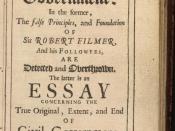In John Locke's "Second Treatise of Government," Locke discusses the process by which humanity comes to exit the state of nature, and enter into a social contract to be governed. Locke, although he would prefer a representative form of government, does concede that the social contractors can choose a form "such as they shall think fit (p.111)," as long as it is by majority decision. The people entrust the authority to "preserve his property, that is, his life, his liberty and estate, against the injuries and attempts of other men (p. 46)." Locke additionally discusses the means by which the government can and should be dissolved, but Locke seems to be making the case for the dissolution of government only as an appeasement to those who are unhappy with their current state, not, as he should, as a realistic and correct means of improving one's standard of living.
Locke uses his view of the nature of human beings and that nature's relationship to property, which is the cornerstone of his argument, to show the reader the process of dissolution.
Locke has faith in the inherent nature of humans, both before and after they exit the state of nature and enter into the social contract. To characterize man's nature in one word, Locke may say that men are content. Within the state of nature, men are content with their own property, as long as others do not use force to take it, thereby entering state of war. Once the people agree to enter into a social contract, by which they delegate their protectorate power to a form of government chosen by majority rule, they are once again content. The people are content now that their property, which really represents their life, estate, and liberty, is now protected by another.



Good!
I like this paper but for it to be usefull to me i need a bibliography to check the sources, but it looks like u know what ur talking about. Good Job!
0 out of 0 people found this comment useful.